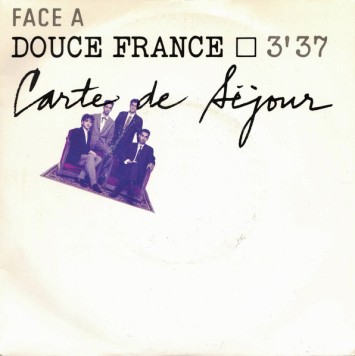A guest posting by J.C. Brouchard (our French Correspondent)

When JC placed a call for a guest posting about Rachid Taha, I thought I could only step up to the plate.
After all, I bought his band Carte de Séjour’s first record back in 1982 and wrote about it on my blog Vivonzeureux! back in 2007 (click here) and earlier this year, I remembered and reviewed one of his solo singles (click here). I have read his autobiography, Rock la casbah and many years ago, I bought on release and thoroughly enjoyed Carte de Séjour’s biggest hit Douce France, which I’m glad to introduce you to today.
What made Carte de Séjour stand out after they formed in Lyon in the early 1980’s is that they were a great rock band, with a line-up made up mostly of « beurs » (a French slang word which became popular at the time, derived from a reverse pronunciation of Arab »). They were maybe one of the first, and not many have followed suit since.
Their name itself was a statement (The « carte de séjour » is the residence card for foreigners in France) and they purposely elected to write lyrics in an arabic-Algerian dialect mixing in some French words.
Carte de Séjour performed their cover of Douce France for the first time on June 15th 1985 at a huge anti-racist concert on Place de la Concorde in Paris. A short clip is on YouTube, with comment by Rachid Taha, complete with subtitles:-
The choice to cover this Charles Trenet song was perfect. The original song itself has a chequered history. It was written and first performed by Charles Trenet in the 1940’s, during the German occupation. Some took this nostalgic paean to France and childhood memories as an endorsement of the Vichy regime, while others saw in it some form of passive resistance to the Germans, harking back to an eternal idealised France. Trenet first recorded it in 1947, and it became a classic of the « chanson française ».
Carte de Séjour recorded their studio version of Douce France with British producer Nick Patrick, who worked a lot with Barclay artists at the time and had produced Alain Bashung’s Touche pas à mon pote the year before. It was released as a single and was also included on their second album, 2 ½.
mp3: Carte de Séjour – Douce France
Asked later what he meant by covering this song, Rachid Taha replied « I meant «Fuck you», » We are here, we are to stay for good, we can sing this, we can sing Brassens,… ».
It was a way to reclaim a piece of French heritage as their own, but if their intentions were initially ironical, as underlined, by the use of a forced Arabic accent, it is not exactly the way in which their cover was ultimately received.
Here’s how Barbara LEBRUN puts it in “Carte de Séjour: Revisiting ‘Arabness’ and Anti-Racism in 1980s France.”, the first academic study published in English about Carte de Séjour (Popular Music 31, no. 3 (2012): 331–46. https://doi.org/10.1017/S026114301200027X) :
« the unchanged lyrics suggested that ‘Arabs’ expressed their love of France just as Trenet, and by extension white French people, once had. This literal interpretation also implied that, like the French, ‘Arabs’ had had childhoods in France, were an integral part of the nation, and kept ‘sweet’ memories of their life in France. This assimilationist interpretation was not intended. (…)
Taha detested Le Pen, but his intentions in this cover were ironic rather than literal. Instead of appropriating the patriotism of the original, his ‘Douce France’ was ‘an antiphrasis. It was out of irony precisely because France was not sweet for immigrants, that we chose that title’ »
The Douce France cover was a soft but also violent way to denounce rampant fascism, in the context of ambient racism, the rising far-right Front national and a new rightist government intent on fighting immigration (If you think the past sounds like our present, you’re unfortunately right !).
This culminated on November 19th 1986, when Parliament was debating a reform of the Nationality Code. With the band’s approval, ex-culture minister Jack Lang and Charles Trenet himself took it upon themselves to hand out copies of the single to members of Parliament at the National Assembly.
I didn’t underline it enough, but Carte de Séjour’s version of the song is a success all over, energic and exhilarating.
Unfortunately, even with a lot of media coverage, it was not that big a hit. The band never really made it big and split after two albums.

I can’t say I enjoyed the band’s version of the song, but… I did enjoy reading about its overall part in French agit-pop history.
My favourite version is Charles Trenet – possibly closer to what I would listen to.
In the last video the band seem to be having a great time. In both versions there’s a kinda Pogues ‘feel’. I know little about The Pogues so I may be wide off the mark.
A very enjoyable read.
Flimflamfan
Un joli morceau d’écriture juste là. Merci
An excellent informative post JCB
I was genuinely excited when JCB’s e-mail dropped into the inbox. He’s someone who has long been an important part of the fabric of the alternative music in France, and I get a real kick out of the fact he reads the blog.
I’ve told him that I will really welcome anything else he wishes to contribute…..there might even be an opportunity to have the occasional feature in which he provides a translation of some of his best pieces over at his own long-running blog, Vivonzeureux! Here’s hoping…….